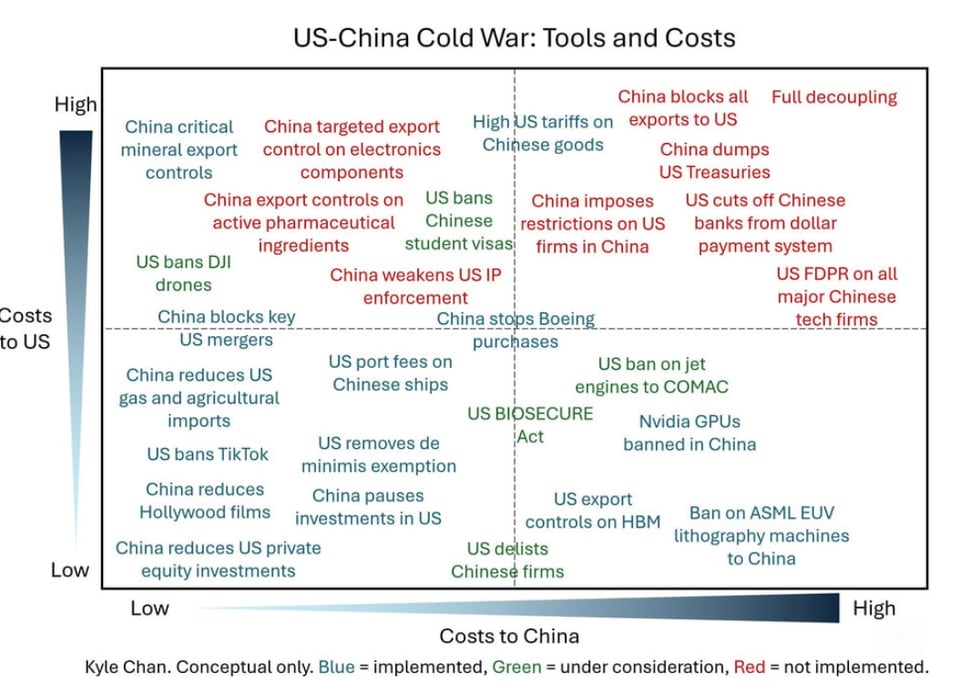Got problems of our own
But we're still doing Summer Book Club
Hello, we’re back after a short break. Our BRICS essay came out, and its argument that the alliance was increasingly shaped by energy concerns and China’s technological advances were taken up in a Guardian editorial leader. Ben Bradlow’s FT comment yesterday takes up another theme: the tension between electrostates and carbon states within BRICS.
This Dispatch looks at the weapons and counter-weapons being wielded by the US and by other countries — mostly, by China.
We’re also finalizing the Summer Book Club list on the Discord. The contenders are listed at the end of this email.
Our next essay for The Polycrisis on Phenomenal World will be about insurance. In the meantime, you can email us (Kate here; Tim here); follow us on Bluesky (Kate, Tim, Polycrisis account) and various other places (LinkedIn, X).
Weapons and counter-weapons
A wave of anti-US anger is growing. The Trump tariff and chips weapon has met the Chinese rare-earth counter-weapon, and Trump has folded, the New York Times reported:
As the flow of those materials stopped, Mr. Trump and other officials began receiving calls from chief executives saying their factories would soon shut down. Ford, Suzuki and other companies shuttered factories because of the lack of supply.
Mr. Trump and his top advisers were surprised by the threat that Beijing’s countermove posed, people familiar with the matter say.
This is the age of economic wars and weaponized interdependence. Economic wars carried out by countries coupled together by networks and flows (energy, finance, trade etc) is like a Minimax problem — the goal is to minimize pain on the self and maximize pain on the adversary.

Are other countries, though, wielding counterweapons against the US so effectively?
The Financial Times last Monday led its home page with a story that the US had so far reaped $50bn as the rest of the world was chickening out against Trump, with most countries declining to impose retaliatory tariffs. It quoted a consultant asserting that multinational companies were increasing their prices worldwide, in order to minimise the effect of tariffs on their US prices.
The latter point is impossible to substantiate, but it’s true that only China has really raised US tariffs in retaliation.
Another NYT story earlier this month adopted the theme we’ve been advancing since November: that non-US countries will increasingly work “around and without the US” to cut their dependence on the unreliable hegemon:
Canada and the European Union have pulled together. Britain and the European Union have had a rapprochement, five years after Britain officially exited the union. The bloc is working toward closer trading relationships with India and South Africa, and with countries across South America and Asia.
Nor is the European Union the only global power adopting such a strategy. Canada is also drawing closer to Southeast Asia, while Brazil and Mexico are working to deepen their ties.
Deepening ties with other countries is slow work, however, when tariff threats being wielded by the US could take effect within days. The other big trading power apart from China — the EU — has nothing to show for its negotiations with the US.
Olivier Blanchard, professor emeritus at MIT, argues that EU must be much more aggressive and do “intelligent retaliation” that “means going, product by product, for what hurts most (politically or economically) and hurts the EU least.” The EU is now contemplating its own counterweapons.
Tariffs on EU goods just announced: 30% across the board, probably higher in some sectors.
— Olivier Blanchard (@ojblanchard1) July 12, 2025
Being nice, giving up the digital tax, did not achieve anything for Europe. Intelligent retaliation is of the essence, even if it leads to dangerous economic and geopolitical waters in…
Alan Beattie summed up why Europe hasn’t used its own counter-weapons:
It’s got the technical and legal tools but the political economy is not yet lined up. Some member states are concerned about alienating Trump because of the US role in Ukraine; some are concerned about counter-retaliation; some are quite sympathetic to him anyway.
What about broader solidarity? If other countries stopped negotiating with the US that would, as Paul de Grauwe argued, minimize the costs of Trump’s trade war for the rest of the world, and maximize the costs to the US. But such global solidarity is harder than it looks. One reason is, as with Europe, the dependence on US security. Another is that many countries and their investor blocs own a lot of US assets. The dollar system is hard to escape, even if, for wealthy countries that benefit from it, it’s more of a guilded cage than a trap.
Green Cold War
Solidarity is a theme in a new essay by Ilias Alami in The Break Down, about the second Cold War. The response by developing countries to this current era of great power competition is different to the Non-Aligned Movement of the 1970s:
“To put it bluntly, where non-aligned countries wanted a seat at the capitalist table in order to collectively flip it, contemporary polyaligned countries want something qualitatively different: a larger slice of the pie on the way to a green capitalist future.”
Ilias uses the examples of eastern European countries competing for EV facilities and African countries competing for green hydrogen exports to Europe. It’s unlikely that every country will win in this zero sum scenario, and many of those countries that are successful, he points out, are essentially marketing their land, labour and nature to international capital markets – with predictably bad consequences for indigenous people, nature, and democracy.
“In the medium term, they risk fostering a lop-sided pattern of “green” industrialisation in the Global South, forcing dependence on the geostrategic imperatives, and the clean tech, of hegemonic powers while compromising urgent domestic needs.”
Better outcomes, he writes, will require a degree of collective action between countries — at least at the regional level.
Nigeria: Can’t do nothin’ for you

Even while most countries seek to negotiate in good faith with the White House on tariffs, capitulation to Trump outside of China is not complete or inevitable.
A recent Rest of World report detailed how African countries have been insisting on data sovereignty from US corporations that dominate the sector. And Nigeria has rejected the pressure that’s reportedly being put on African countries to accept people kicked out of the US, whom the administration says couldn’t be sent to their “home countries”. South Sudan has accepted some people; so has Eswatini; but when Nigeria’s foreign minister Yusuf Tuggar was asked on Channels Television whether his government would accept such people from the US, he said:
"We already have over 230 million people… In the words of the famous US rap group Public Enemy — you'll remember a line from Flavor Flav: 'Flavor Flav has problems of his own. I can't do nothing for you, man.'"
"It will be difficult for a country like Nigeria to accept Venezuelan prisoners into Nigeria. We have enough problems of our own.”
That’s is for this week.
BOOK CLUB LIST: (go to our Discord to make new suggestions, or vote in the poll later this week)
Extractive Capitalism: Laleh Khalili
The Bridge - Natural Gas in a Redivided Europe - Gufstafson
Developmental Environmentalism - Liz Thurborn
Neomercantilists - Eric Helleiner
Inflation: A Guide for Users and Losers - Mark Blyth
Crackup Capitalism - Quinn Slobodian
In Praise of Floods - Scott
Crude Capitalism - Hanieh
Something by Stephen Hymer on mult-national corporations
Empire of AI by Karen Hao
Other stuff to read in the meantime:
The US is losing its research lead over China, according to Nature’s index.
Henry Farrell and Abe Newman on the enshittification of US power
VCs are backing companies that do "physical AI” through sensors that monitor pipes and electrical infrastructure).
Add a comment: